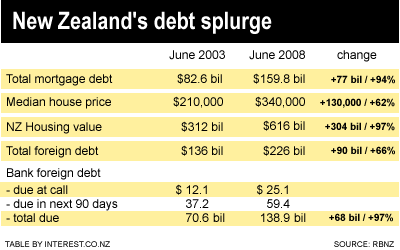These are nervous times for banks all around the globe as they try to refinance debt they owe to banks in other countries. The international inter-bank credit markets virtually froze this week as banks stopped trusting each other. They were petrified in the wake of the shock collapses of AIG, Washington Mutual and Lehman Bros, the forced mergers of Merrill Lynch, Halifax Bank of Scotland and Wachovia, and the bailouts of Fannie Mae, Freddie Mac, Bradford and Bingley, Fortis and Dexia.  Reserve Bank Governor Alan Bollard acknowledged the disruptions on global credit markets this week when he said some parts of the inter-bank markets had "jammed up," which would be a significant concern if they remained frozen for longer than a few days. This matters for New Zealand's banks because over the last 5 years New Zealand banks have borrowed heavily in these international credit markets on our behalf and have shuffled it through to us in the form of more and bigger mortgages, which have promptly use to boost house prices.
Reserve Bank Governor Alan Bollard acknowledged the disruptions on global credit markets this week when he said some parts of the inter-bank markets had "jammed up," which would be a significant concern if they remained frozen for longer than a few days. This matters for New Zealand's banks because over the last 5 years New Zealand banks have borrowed heavily in these international credit markets on our behalf and have shuffled it through to us in the form of more and bigger mortgages, which have promptly use to boost house prices.
About 47% of all bank lending in New Zealand is funded by offshore borrowing, while about half of that offshore borrowing has to be refinanced every 90 days. Our national accounts show NZ$25.1 billion of our debt is "at call", which means it has to be refinanced daily by our banks. This is slightly more than double what it was 5 years ago before the housing boom. There is a further NZ$59.4 billion that has to be refinanced every 90 days or less, which up up about 60% from 5 years ago. This combined NZ$84.5 billion of debt rolling over every 90 days or less is what is keeping our bankers and the Reserve Bank Governor up at nights. If the inter-bank credit markets were to remain frozen for much more of that 90 days, New Zealand's banks have a significant issue to manage. The problem isn't quite as bald or as bad as it appears. Most of that NZ$84.5 billion is borrowed from parent banks in Australia or one of the other big four banks in Australia. There is still inter-bank lending going on between these big four banks, which include Commonwealth Bank of Australia (CBA), ANZ (ANZ and National), National Australia Bank (BNZ) and Westpac, although at higher costs. So the real issue becomes whether the foreign inter-bank lending between Australia's big banks and the rest of the world jams up too. Most estimates put the size of this short term foreign debt owed by Australia's banks at around A$150 billion (NZ$175 billion). The danger with any short term debt is the unexpected knock on the door from the lender saying they want their money back rather than just letting it roll over. There's no suggestion non-Australasian banks would want to take all their money back at short notice. What's much more likely is they would want some of it back and charge a lot more for the rest. This is the inevitable result of borrowing too much too short from the rest of the world to invest in housing. The Reserve Bank and others have warned that eventually New Zealand's banks and ultimately all the mortgage borrowers would be at risk if market volatility disrupted that supply of cheap short term money. Technically, our banks have the ability to ask for the mortgage to be repaid at any time, even if it is structured as a 20 year mortgage. Any wholesale recall of that mortgage debt would cause chaos and destroy a bank's brand. What's more likely is a crumbling at the edges where banks stop new lending and are extremely tough with any refinancings or top-ups. Borrowers wanting 80% plus loans or "˜low doc' loans can forget about it for now in the current environment. The moment of truth is upon us as credit markets seize up. Our Reserve Bank Governor and our banks will be crossing their fingers the freeze thaws soon. If it doesn't, those who fund offshore (ie not Kiwibank) will be increasing fixed mortgage rates significantly and curbing new lending drastically.

We welcome your comments below. If you are not already registered, please register to comment
Remember we welcome robust, respectful and insightful debate. We don't welcome abusive or defamatory comments and will de-register those repeatedly making such comments. Our current comment policy is here.